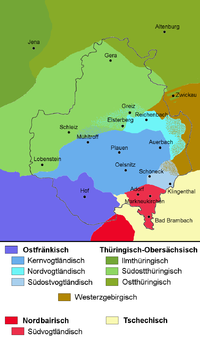Vogtland
| Vogtland | ||
|---|---|---|
|
Spoken in |
Germany ( Saxony , Bavaria ) ( Plauen and the surrounding area, partly also in Hof ) |
|
| speaker | approx. 200,000 (native speakers) | |
| Linguistic classification |
||
Vogtland refers to a number of dialects that are mainly spoken in the Saxon Vogtland .
history
The peculiar melody of this dialect can be heard especially in rural areas. In addition to Lusatia , it is above all the Ore Mountains and the Vogtland that still have relatively independent dialect areas. A relationship between the Ore Mountains and Vogtland dialect results from the settlement history of these areas. There were three streams of settlers: in the 12th and 13th centuries they opened up the territory inhabited by the Sorbs . The first wave of settlements came from the Upper Palatinate and reached as far as the southern Vogtland. The second came from Main Franconia and another from Central Germany . This was followed by the emergence of political administrative districts - a linguistically closed area. Over the centuries, three major dialect areas have emerged.
Distribution area
Core Vogtland
Kernvogtland is an East Franconian dialect which is spoken in most of the Saxon Vogtland, especially in the area around Plauen , Oelsnitz and Auerbach .
Northern Vogtland
To the north there is a larger transition area into southeast Thuringia , which is referred to as Northern Vogtland .
Southeast Vogtland
In the area around Schöneck and Klingenthal , the dialect changes from Southeast Vogtland to Erzgebirge . A special feature of these dialects is above all the drawn out and sometimes overemphasized pronunciation of vowels - “singing” - which is most pronounced in the upper Göltzschtal around Auerbach. As part of a dialect continuum, these dialects represent a transition area from East Franconian to Upper Saxon . So here too - at least in Southeast Upper Vogtland - the word hoa (o and a are spoken together as a medium-length vowel between a and o, an im High German not used phon ), which is used by dialect speakers as a synonym for “yes” or as an affirmative modal particle.
Southern Vogtland
Southern Vogtland is spoken south of the Freiberg - Wohlbach - Gunzen - Hoher Brand line . This is a northern Bavarian dialect that clearly stands out from the rest of the dialects. In addition to the rolled r , the double sounds are particularly characteristic. There is an almost abrupt language boundary to the other dialects, especially to the Zwotatal .
literature
- Friedrich Barthel: The Vogtland-West Ore Mountains language area - cultural geographic studies on the border problem . Diss. University of Leipzig, Graefenhainichen 1933
- Gunter Bergmann, Volkmar Hellfritzsch : Small Vogtland dictionary . Bibliographisches Institut, Leipzig 1990, ISBN 3-323-00309-8 .
- Brigitte Unger u. a. (Ed.): The Vogtland Atlas. Regional atlas on nature, history, population, economy and culture of the Saxon Vogtland . 3rd ext. Edition. Verlag Klaus Gumnior, Chemnitz 2007, ISBN 978-3-937386-18-8 .
